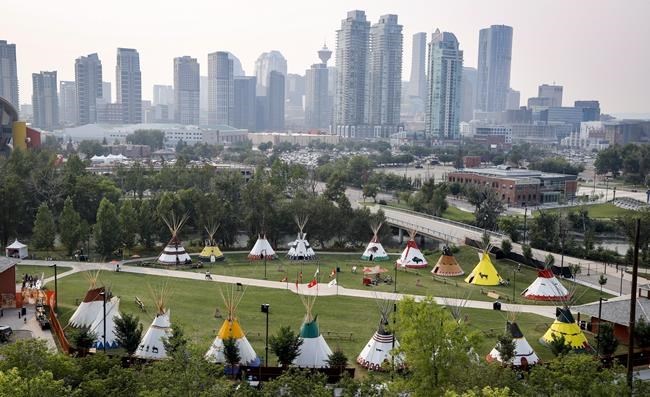CALGARY — Flags at the Elbow River camp at the Calgary Stampede are at half mast this year to mark recent discoveries of unmarked graves at former Canadian residential school sites.
A moment of silence is observed every day in a sombre ritual.
The annual camp on the Stampede grounds was first held in 1912 to highlight the cultures of the Calgary-area Siksika, Piikani, Kainai, Tsuut’ina and Stoney Nakoda First Nations. It's a double-edged sword this year as visitors to the camp show renewed interest about residential schools.
"Those kind of things definitely are asked about," said Lowa Beebe, whose family has had one of the 26 teepees at the camp. "Sometimes it's inappropriate, but the public doesn't necessarily know.
"It definitely does open old wounds. People who have approached me, I have told them please don't ask because, although I'm definitely stronger, a lot of our community members are not as strong."
The camp wasn't set up when COVID-19 forced the Stampede to cancel in 2020 and lingering concerns mean only 18 teepees are set up this year.
Beebe said it's important to be there because Elbow River camp, until recently known as Indian Village, plays a key role in maintaining First Nations culture.
"It existed before it became legal for us again to participate in our own culture in the '50s. Before that we were not allowed to, so being part of the Stampede really did help a lot of people keep their culture alive."
That included a time when residential schools still existed and Indigenous children were taken from their homes and forbidden to practise their culture.
Beebe said the discovery of what are believed to be the remains of hundreds of children on former residential school grounds is not a surprise, but it's difficult for many families, who often keep their grief and memories private.
"It is not a surprise to us that our children did not come home, that our family members did not come home. They were still missing. My family is directly affected, as well as all of these families indirectly affected by this.
"It is a dark part of history that we have lived, with people denying it and mass graves."
Beebe said many in her family attended the schools. One uncle was shipped from the Blood reserve south of Calgary to northern Manitoba so he couldn't run away and return home.
Keith Lefthand and his wife Jamie patiently answer questions from visitors in front of their teepee. The couple explain the significance of ceremonial dress and artifacts.
Lefthand's mother attended a residential school where he said she was forced to repeat the same courses for three straight years because the operators were paid for every child in their care.
"They took her education away from her. She could have been graduating Grade 12," he said.
Lefthand said he's happy the story has received worldwide attention, but it's hard.
"It hurts us for the parents who lost their children. I can't imagine. In time I hope their wounds are healed," he said.
"It's been talked about for years amongst First Nations people. It's just where do we start the healing process? My family survived, but the families who lost their little ones ... I can't imagine."
Jamie Lefthand said her grandparents both attended residential schools. She always wondered why the family cattle brand was the number 44.
She would learn that all her grandmother had at school was her locker — No. 44 — where her belongings were kept. It was something she held on to as an adult.
"I asked her why and she said that was the only thing that was ever (her) own," she said.
"It was one little box. Those attending the school ... were just numbers."
Jamie Lefthand finds it difficult talking about what it must have been like for parents to watch their children taken away.
"Nowadays it's like kidnapping. It's a crime. We had no rights then."
This report by The Canadian Press was first published July 15, 2021.
— Follow @BillGraveland on Twitter
Bill Graveland, The Canadian Press



